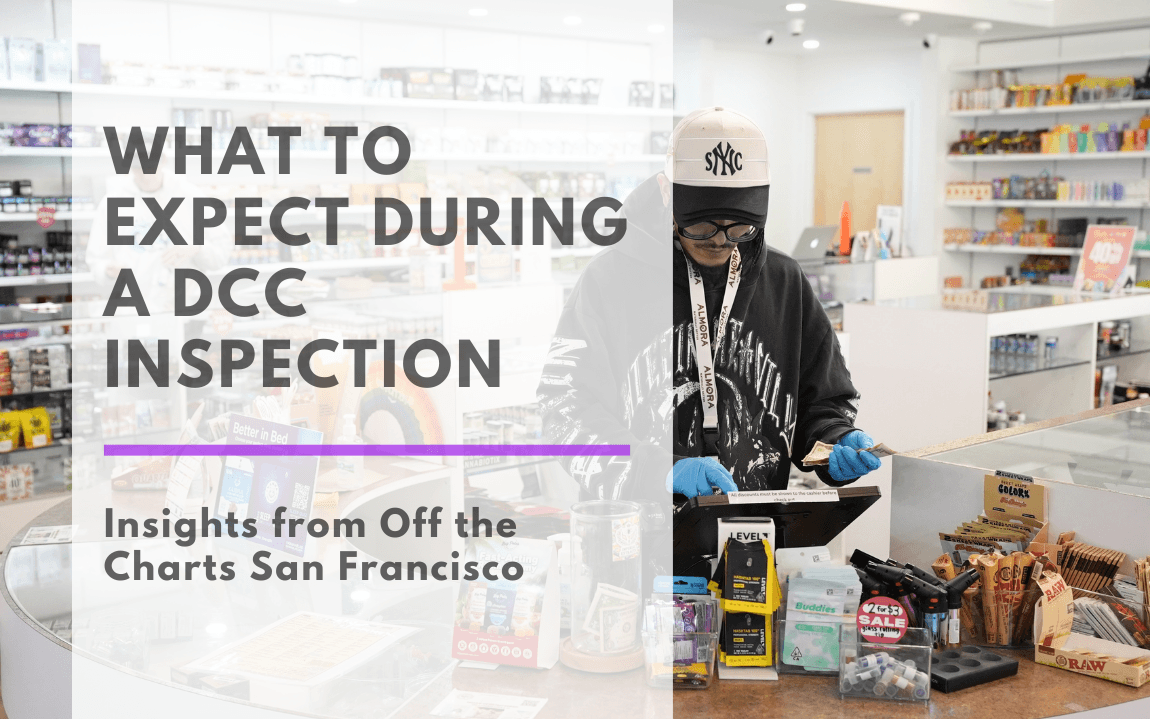In the ever-evolving landscape of the California cannabis industry, maintaining compliance with state regulations is crucial. Off the Charts (OTC) San Francisco recently underwent a surprise inspection by the Department of Cannabis Control (DCC). We spoke with Jordan Kuhl, the store manager, to gather insights from this experience. PLUS! Download our California DCC Inspection Checklist below!

About Off the Charts San Francisco
Off the Charts (OTC) San Francisco is a proud member of the Off the Charts family, a mom-and-pop-run cannabis franchise that started in Vista, California. Known for their commitment to providing high-quality cannabis at reasonable prices, OTC has expanded to over 20 locations across California, with additional stores in New Mexico and Ohio.
As the first Northern California location, OTC San Francisco is dedicated to serving the local community by ensuring accessibility to cannabis, while maintaining stringent compliance with state regulations. Their mission is to offer the lowest prices possible, making cannabis accessible to all, and fostering a welcoming environment for both medical and recreational users.
💡 Learn more about How Off the Charts Opened 30+ Locations in 2 Years with Meadow
The DCC's Arrival at Off the Charts San Francisco
On a routine morning, the team at Off the Charts (OTC) San Francisco was met with an unexpected visit from the Department of Cannabis Control (DCC). Three inspectors arrived promptly at 10 a.m., equipped with badges. It’s important that before you begin the inspection as a cannabis retailer, you should confirm the inspectors are affiliated with the state to ensure security measures at your store. Anyone can walk in with a badge claiming they're of official business.
Following proper protocol, the inspectors signed in and engaged with the security guard to understand the facility's security measures, including break coverage and access protocols.
Once inside, the inspectors met with Jordan Kuhl, the store manager. Prepared for the inspection, Jordan grabbed a pen and notepad to document the proceedings. It’s important that whoever from your staff is leading the inspection is taking diligent notes as a notice to comply will be issued. In the notice to comply, any flags should be addressed by the retailer with an update to standard operating procedures.
The DCC team began their inspection by entering the bud room, where they immediately started examining product labels, cannabis testing information, and Certificates of Analysis (COAs) on every shelf. Their meticulous approach set the tone for a comprehensive compliance check, aiming to ensure that OTC was adhering to all state regulations.
Here are OTC's key takeaways and lessons learned that can help other cannabis businesses stay ahead of regulatory requirements.
You can also refer to this document provided by the DCC for more detailed information in preparing for an audit.
Distributor-Determined Compliance Issues
These compliance issues are primarily influenced by the distributors and their adherence to state regulations. However, it is essential for retailers to be vigilant and ensure that all products received from distributors meet the Department of Cannabis Control (DCC) standards.
Product Inspection and Labeling
Cannabis Testing: COA Compliance
Products without COAs or most recent lab test result labels were quarantined. "One of the investigators pulled an ounce from the shelf and showed me that the item was missing the necessary COA that the DCC requires the vendor to upload to Metrc prior to shipping" Jordan explained.

Packaging Standards
Products with cartoonish packaging, which could appeal to children, were embargoed. In one example, a product’s packaging was described as "too cartoony,” with an illustration of a woman with exaggerated features. “They pulled everything that could be deemed attractive to children," said Jordan.
The DCC emphasized that marketing practices must comply with regulations designed to protect and avoid marketing towards minors. This product was removed from the shelves, put into a paper bag, and placed in view of the cameras. The DCC inspectors instructed Jordan to not interact with these products until further notice, otherwise they would be reprimanded with an expensive fine.
Upcoming Regulations: “Disposable” Vapes
The wording "disposable" on vape products will soon be prohibited in California due to environmental concerns. Distributors should prepare for this change and adjust their packaging and labeling accordingly.
These compliance issues, though largely outside the retailer's direct control, must be strictly adhered to according to the Department of Cannabis Control's guidance.
Following the inspection, Jordan was tasked with contacting the distributors for necessary corrections and awaiting further notice from the DCC on outstanding issues.
Dispensary-Managed Compliance Responsibilities
The following compliance responsibilities fall directly under the purview of the dispensary. It is crucial for retailers to maintain rigorous standards and processes to ensure full adherence to the Department of Cannabis Control's regulations. During the audit, the DCC highlighted several critical areas. Some notes were reminders, while others were urgent corrections that all retailers should implement immediately in preparation for a compliance audit.
Inventory Tracking and Compliance
Backstock Labeling
All back stock items must have the blue Metrc tag or a copy of the blue Metrc tag attached to the container holding those items. This enhances traceability and helps the DCC recognize what items belong to which packages. "Their team also advised me that any items located in a drawer or cabinet on the floor is also considered backstock, and would also require the tag associated with those products," Jordan noted.
Handling Trade Samples and Donations
The inspectors advised Jordan on proper procedures that must be followed when processing trade samples and donations.
Employee details and transaction records must be recorded on the adjustment. Read more about Trade Sample regulations from the DCC Guidelines: §15041.2. Trade Samples
Retailers should also refer to this Metrc Support Bulletin: Providing a Trade Sample to An Employee
“When providing cannabis goods to employees as trade samples, you must adjust the quantity in the trade sample package and utilize the “Trade Sample” package adjustment reason. In addition, you must include the name or licensee-assigned employee number of the employee and the date and time the cannabis goods were provided to the employee in the Required Note field.”
Expired Products
The inspectors verified product packaging and ensured that Jordan was aware of how to manage expired products and that they are properly disposed of as waste.
Retailers can easily identify expired products in Metrc by filtering packages by their received date. Regular checks can prevent non-compliant sales. "They advised that anything that's received more than a year ago is very likely past its certificate of analysis test date," said Jordan. “Luckily, we did not have any expired products for sale.”
Retailers have to comply with §15406. Cannabis Goods for Sale (b) “The licensed retailer has verified that the cannabis goods have not exceeded their best-by, sell-by, or expiration date if one is provided.”
Retailers utilizing Meadow can also verify and record product expiration dates and reception dates within the POS system, with just a few clicks, avoiding Metrc entirely. “We use Meadow reports and dashboards to regularly check on upcoming expiration dates–it’s that easy,” Jordan added.
Security and Access Protocols
Security is a critical aspect of cannabis retail operations. The DCC inspection at OTC included a detailed review of security measures:
Security Guards and Surveillance
Inspectors examined security guard protocols and the surveillance system, ensuring that 90 days of footage was available. Guards should not leave the dispensary unattended, which means there should be coverage during guard breaks, as well.
Restricted Access
The inspectors verified that all necessary doors were locked and only employees could access these areas. "They did want to check out the distro as well because we are a micro business; however, we haven’t started our distribution yet," Jordan explained, showcasing the inspectors' meticulous attention to detail of the licensed premises. The inspectors toured the entire space, from the front door to the manager’s office. They were mainly looking for out of place cannabis products. Cannabis products should not be stored in non-secure areas like break room fridges, offices, or common areas.
Employee Identification
Employee badges must include their license number, employee number, and the cannabis license number. "Ours are compliant. We just updated them," Jordan confirmed.
Meadow POS Dispensary Software Compliance Features
OTC San Francisco leverages Meadow's comprehensive point-of-sale system to enhance compliance and streamline operations. During the audit, several features were particularly beneficial:
✔️ Built in Purchase Limit Controls
Meadow's purchase limit controls, complete with a progress bar, prevented sales that exceeded recreational and medical limits. "Meadow has a great tracking system, that anything you scan, it displays a little bar that fills up as you build the order, and it'll prevent you from going over," Jordan demonstrated.
✔️ Medical Verification Tools
The ability to upload patient ID cards directly into the system ensured that all medical sales were properly verified and documented. "We can take a picture and upload it into Meadow so it's permanently and securely stored there," Jordan said.
✔️ Accurate Metrc Reporting
When the inspectors randomly selected a product from the shelves, every unit of inventory was accounted for in Metrc. With daily account monitoring and no issues of “Ghost Inventory” or negative packages, Meadow is the perfect partner to ensure compliance at their dispensary.
💡 Learn more: Key Features of Meadow’s Smart Metrc-Compliant Dispensary Software System
Next Steps for Compliance
In light of the DCC audit, OTC San Francisco has outlined several next steps to enhance their compliance efforts:
- Blue Sticker System: Implement a system for blue sticker copies on all backstock items to ensure batch traceability.
- Refine Procedures: Tighten procedures for handling trade samples, promos, and donations to include all necessary details and employee information.
- Dispose of Embargoed Products: Properly dispose of any products with non-compliant packaging, such as those with cartoonish designs. "They instructed me how to handle them and placed everything in evidence bags and sealed them with tape," Jordan recounted.
- These details will be included in their response to their notice to comply.
Conclusion
Off the Charts San Francisco's recent DCC audit underscores the importance of meticulous compliance in the California cannabis industry. By following these insights and leveraging tools like Meadow's POS system, cannabis retailers can better navigate the complexities of state regulations, ensuring a smooth operation and avoiding potential fines.
💡 Learn more about Cannabis Compliance on the Meadow Blog: Cannabis Recalls Are Rising: Avoid Six-Figure Fines with Cycle Counts


 ️
️